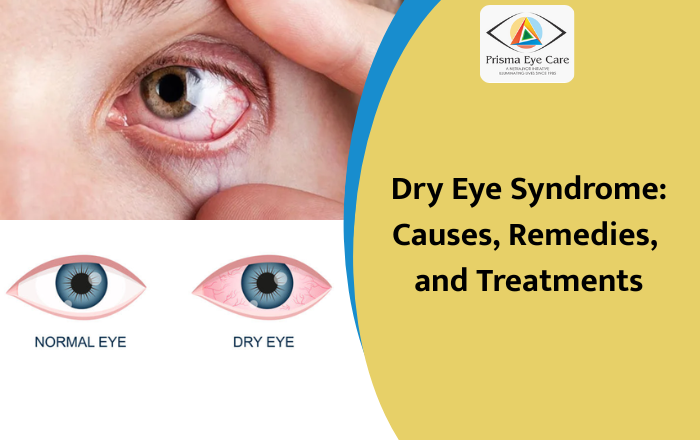If your eyes often feel scratchy, irritated, or watery for no clear reason, you might be dealing with dry eye syndrome. This is a condition where your eyes don’t make enough tears, or the tears evaporate too quickly. It’s more common than you might think, and it can happen to anyone whether you work on a computer all day, live in a dry climate, or just notice changes as you get older. The good news is that there are plenty of ways to manage it.
In this blog, we’ll look at what causes dry eyes, simple home remedies that bring relief, and the medical treatments that can make a real difference.
What is Dry Eye Syndrome
Dry eye syndrome happens when the tear film the thin layer of fluid that keeps your eyes moist doesn’t work properly. This tear film is made of three layers: oil, water, and mucus. When something goes wrong with any of these layers, your eyes can feel dry, gritty, or even watery (yes, watery eyes can be a sign of dryness).
While anyone can get dry eyes, certain people are more likely to develop it. This includes older adults, women (especially after menopause), people who wear contact lenses, and those who spend long hours staring at screens.
Causes of Dry Eyes
– Environmental Factors
Your surroundings play a big role in eye comfort. Windy conditions, smoke, air pollution, or living in a dry climate can cause tears to evaporate quickly. Even spending time in air-conditioned or heated rooms can leave your eyes feeling parched. Seasonal changes, especially winter, can make symptoms worse.
– Lifestyle and Health Conditions
Not drinking enough water, eating a poor diet, or not getting enough sleep can lead to dry eyes. Certain health conditions like diabetes, rheumatoid arthritis, or thyroid disorders can also affect tear production. Wearing contact lenses for long periods is another common trigger.
– Medications That Can Trigger Dry Eyes
Some medicines reduce tear production as a side effect. These include antihistamines, antidepressants, birth control pills, and certain blood pressure drugs.
Symptoms You Shouldn’t Ignore
Dry eyes can show up in different ways. Some people feel a sandy or gritty sensation. Others notice burning, stinging, or redness. You might find that your vision becomes blurry but improves after blinking. Light sensitivity is also common. And if your eyes water a lot, it might be your body’s way of overcompensating for dryness.
Home Remedies for Dry Eyes
– Warm Compress and Eyelid Hygiene
A warm compress helps open up blocked oil glands in your eyelids. This keeps the tear film balanced and slows down evaporation. To do this, soak a clean cloth in warm water, place it over your closed eyes for a few minutes, then gently massage your eyelids.
– Stay Hydrated and Adjust Your Diet
Your eyes need enough water to produce healthy tears. Drink plenty of fluids during the day. Include foods rich in omega 3 fatty acids, such as salmon, flaxseeds, and walnuts, as these can improve tear quality. Reducing caffeine and alcohol intake can also help.
– Screen Breaks and Blinking Exercises
Staring at a screen can make you blink less often, which causes tears to dry up. Try the 20-20-20 rule: every 20 minutes, look at something 20 feet away for at least 20 seconds. Make a conscious effort to blink fully and often.
– Use a Humidifier
Adding moisture to the air can prevent your eyes from drying out. A small humidifier near your work or sleeping area can make a big difference.
Medical Solutions for Dry Eye Syndrome
– Artificial Tears and Lubricating Eye Drops
Over-the-counter lubricating drops can give quick relief. Look for preservative-free options, especially if you need to use them more than four times a day.
– Prescription Medications
If regular eye drops aren’t enough, a doctor may prescribe anti-inflammatory drops or medicines that help your eyes produce more tears.
– In-Clinic Procedures
Some treatments focus on keeping tears in your eyes longer, such as tiny plugs placed in the tear ducts. Light-based treatments may also be used for certain gland problems linked to dry eyes.
When to See an Eye Specialist
If your symptoms last for more than a week or two despite home care, it’s time to get checked. Seek medical help right away if you notice sudden changes in vision, severe redness, or significant pain. Early treatment can prevent complications like eye infections or damage to the cornea.
Frequently Asked Questions
1. Can dry eye syndrome go away on its own
Mild cases caused by temporary factors like dust or short-term illness can clear up on their own, but long-lasting dryness usually needs ongoing care.
2. Is dry eye the same as computer vision syndrome
Not exactly. Computer vision syndrome can cause dry eyes, but it also includes other symptoms like headaches and neck strain.
3. Can diet really help with dry eyes
Yes. Omega 3 fatty acids, vitamins A and C, and staying hydrated can all improve tear quality.
Expert Eye Care in Baramati
If you are in Baramati and struggling with dry eyes, Prisma Eye Care, a leading Eye Hospital in Baramati, led by Dr. Harshal Rathi, offers care for dry eye syndrome and other vision problems. Whether your symptoms are mild or severe, getting a proper diagnosis can set you on the right path to relief. Book your visit today and take the first step toward clear, comfortable vision.


